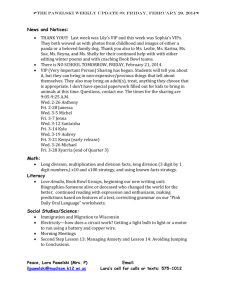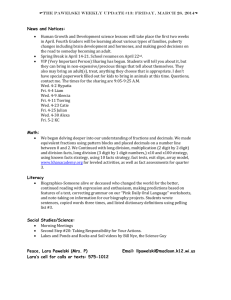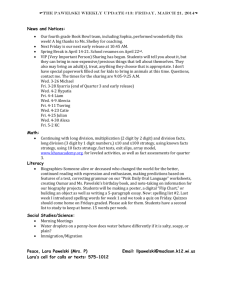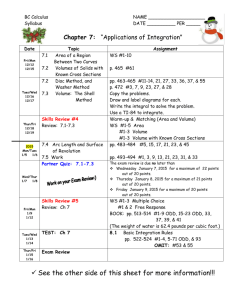Bio_125_Syllabus_`07
advertisement
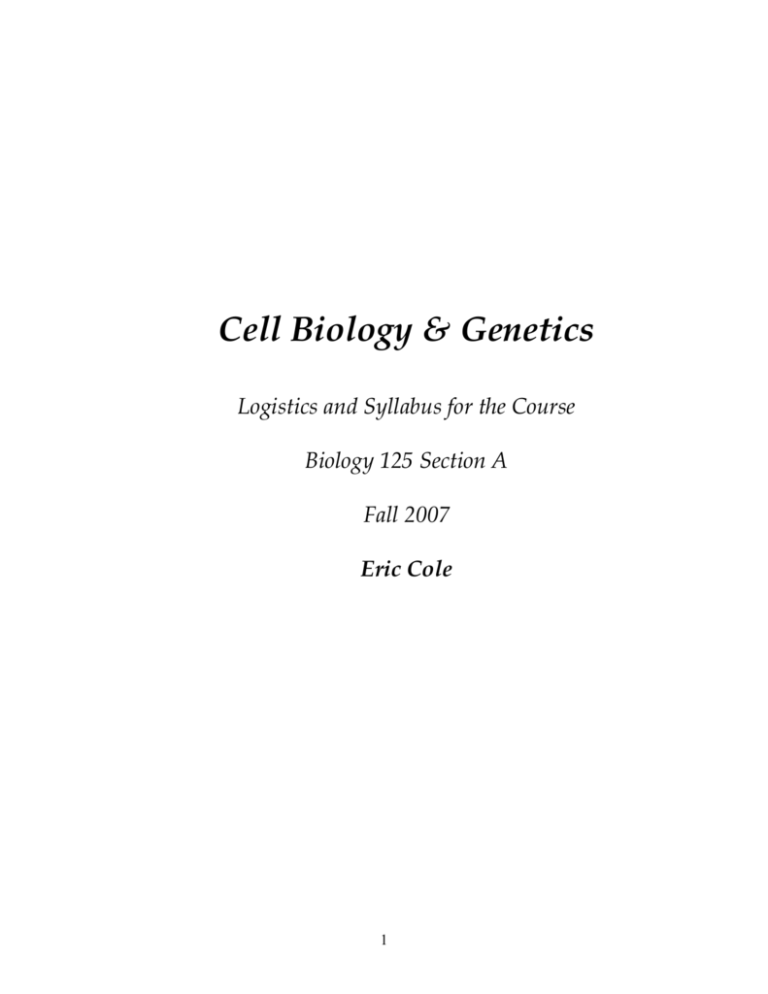
Cell Biology & Genetics
Logistics and Syllabus for the Course
Biology 125 Section A
Fall 2007
Eric Cole
1
Logistics of the Course
Instructor: Eric Cole (Office SC 222).
Bio. 125 Sections C, F and K.
Lectures: M,W,F 8:00-8:55 AM SC 278
Labs: “C”: Tues. 8:00 – 10:30 AM, “F”: Wed. 11:50-2:20. “K”: Thurs. 3:40-6:10 PM.
Room SC273.
Office Hours: Mon. 1:30-3:00 PM, Tues. 10:30-12:00 AM., Fri. 9:00-10:30. SC222
Texts: Biology (Seventh Edition) Campbell, W., et al.
Laboratory Guide for Introductory Biology
Grading: Four, hour-long exams will be taken.
Exam schedule:
Sept. 26
Oct. 12
Oct. 31
Nov. 14
Final Exam (comprehensive with genetics focus):
Thursday, December 14, 2:30-4:30.
Each Exam is worth 50 points (Total = 200).
Library Project is worth 25 pts.
Two lab write-ups each worth 50 points: total = 100 pts.
Genetics computer problem = 25 pts.
Lab Final 50 pts.
Final Exam is worth 100 pts.
******************************************************************************************************************************************************
Course Total: 500 points.
A = 90-100%
B = 80-90%
C = 70-80%
D = 60-70%.
Make-up policy:
If there is a reason you cannot take a test, you must speak with me before the
test. Make-ups will not be given except under extraordinary circumstances.
Extra Credit: attending Departmental Seminars, 8 pts each, submit one-page summary,
or write up a summary of some current breakthrough or discovery in Cell
Biology or Genetics (8 pts each up to two total: 16 points possible). OR write a
summary of one of the articles in the Bio125 supplementary readings (except
article # 1).
Philosophical Notes:
2
You are responsible for your success. Learn to recognize when you don't
understand something, and take responsibility for that! The only one keeping you out
of my office is you. Go get em!
Tutorials: Tuesday (2:30-4:00) & Friday, (2:30-4:00) room SC210*.
3
BIOLOGY 125 LECTURE SCHEDULE
(Eric S. Cole, Fall '07)
Lecture
Subject
Reading
1
(9/5)
Wed.
Logistics. What is modern Genetics?
The Map and the Territory
Structural Systems/ Energy/ Information
Ch 1
(2-29)
Molecular Building Blocks:
2
(9/7)
Fri.
Chemistry
Atomic Chemistry (elements/ orbitals/ valence)
Molecular Chemistry (types of bonds). Polarity.
Energy, Electrons, Electronegativity.
Ch 2
(30-46)
3
(9/10)
Mon.
Chemicals in Solution (1)
Solubility, pH.
{Concept Pyramid}.
Ch 3
(47-57)
4
(9/12)
Wed.
Chemicals in Solution (2)
Molarity
Hydrocarbons
5
(9/14)
Fri.
Organic Chemistry
Hydrocarbons & Functional Groups.
Carbohydrates: Sugars.
Monosaccharides, Disaccharides, Polysaccharides.
Ch 4
(58-74)
6
(9/17)
Mon.
Lipids
Structure
Fats, Phospholipids, Steroids
Functions: Storage/membranes/hormones
(sat. unsat.) Soaps and saponification
(75-77)
7
(9/19)
Wed.
Proteins
(77-86)
Protein Structure
Amino acids/ Functional groups/ Polypeptides.
Quaternary Structure/ roles.
Antibodies revisited (4 levels of structure/ charge landscapes).
8
(9/21)
Fri.
Nucleotides
(86-91)
Structure: DNA, RNA.
Functions: Info./ Energy Transfer Intermediates/ Second messengers.
4
Special:
(9/24)
Mon.
Library Project
(Handouts)
(Charles Priore)
EXAMINATION 1
Molecular Building Blocks:
a structural view of life
(9/26)
Wed.
Protein/ Membrane Dynamics
9
(9/28)
Fri
Enzyme Activities
Ch 8
Catalytic Roles, Activation Energy, Chemistry.
(150-157)
4 ways to aid catalysis/ 2 cardinal rules: unchanged/ exergonic.
Mystery of Polymerization.
Allosterism/ Regulation/ Phosphorylation (substrates/ proteins).
10
(10/1)
Mon
Epinephrine and the Phosphorylation Cascade
protein – protein interactions
cell signaling
11
(10/3)
Wed
Trans-Membrane Transport
Ch 7
Membrane Transport (passive/ facilitated/ active).
(130-138)
Giannini website (osmosis/ gradients/ assistance/ up-hill).
12
(10/5)
Fri.
Bioelectricity
Channels/ Pumps/ Selectively Permeable Membrane.
(Demo: Ussing’s Frog-skin experiment.)
(1016-1021)
13
(10/8)
Mon.
The Protein Trafficking Pathway (cellular components)
The components: nucleus, nucleolus, and ribosomes
The endo-membrane system.
(Demo: Ciliate secretion)
Ch 7
124-129.
Ch 6, 94-106
14
(10/10)
Wed.
The Pathway.
Palade Paper
Key experiments and discoveries. (TEM/ ARG).)
* reading is a bit ahead (for more advanced study). Do study figure 17.25.
5
205-206
209-210
EXAMINATION 2
Protein/ Membrane Dynamics
(10/12)
Fri.
Fall Break 10/13-10/16
Cellular Dynamics
15
(10/17)
Wed.
Replicating a Cell.
Cytoskeleton/ T/ F/ IF/ centrioles/ cilia.
Structure & Motility
Chromosomes/ Centromeres/ Histones/
(Demo: Video-microscopy, Tetrahymena dividing)
Ch 6
112-121
Ch 12
218-235
16
(10/19)
Fri.
The Pathway. Methods of Analysis. (I)
PMAT, the steps. Light/ SEM/ TEM/ Fluorescence.
17.
(10/22)
Mon.
The proteins. Methods of Analysis. (II)
SDS-PAGE/ Antibodies/ Westerns.
The proteins.
18
(10/24)
Wed.
Cyclins and control of the cell division cycle.
MPF and regulation of the Cell Cycle
19
(10/26)
Fri.
Methods of Analysis. (III)
The conjusome. Sonication. Differential centrifugation. PAGE and
Mass Spectrometry.
20
(10/29)
Mon.
Other Organelles: Endosymbiont Theory.
EXAMINATION 3
Cellular Dynamics
Wed. (10/31)
Energetics:
6
Handouts
Defying entropy with phosphate
21
(11/2)
Fri.
Respiration (I)
-Overview (Glycolysis, Transport, Transition,
- Kreb's cycle, Oxidative Phosphorylation)
- Glycolysis (detailed)
Ch 9
160-167
22
(11/5)
Mon.
Respiration (II)
- Kreb's Cycle (detailed)
- Electron Transport Chain (detailed)
168-174
23
(11/7)
Wed.
Anaerobic Respiration
- Pasteur effect/ lactic acid and ethanol fermentation
Overview.
174-180
24
(11/9)
Fri.
Photosynthesis (I)
- Overview
- Molecules and Light
- Light reactions
Chapter 10
181-192
25
(11/12)
Mon.
Photosynthesis (II)
- Calvin-Benson Cycle
- Overview: How do cells drive anabolism?
192-195
EXAMINATION 4
Defying Entropy with Phosphorus
(11/14)
Wed.
Information
26
(11/16)
Fri.
Patterns of Inheritance:
Mendel & His Monkey Wrenches
Information and Inheritance
- Patterns of Inheritance (Mendel)
- Dominance/ Recessiveness
27
(11/19)
Mon.
The Dihybrid Cross
- Meiosis and a cellular mechanism
for inheritance
Thanksgiving Break
(11/21-11/25)
7
Chapter 14
251-260
Ch. 13
236-250
28
(11/26)
Mon.
Genetic Monkey Wrenches
- Linkage/ Sex Linkage/ others
260-273
Ch 15
274-28
29
(11/28)
Wed.
Using Linkage to Map Genes
- lemons to lemonade
Ch 15
285-292
30
(11/30)
Fri.
Molecular biology of gene expression
Molecular Genetics
- What is a gene?
- How is it transmitted? - How is it expressed?
- Is it forever perfect and constant?
- DNA: Replication, Expression and Recombination
31
(12/3)
Fri.
DNA Replication
- Classic experiments/ semiconservative model
- Mechanism.
- How is DNA synthesis coupled to cell division?
300-307
32
(12/5)
Wed.
Gene Expression (I)
- Where do proteins/enzymes come from?
- DNA to RNA to Protein (The Genetic Code).
- Transcription (RNA Polymerase).
- RNA Processing (Introns, exons).
Chapter 17
309-333
33
(12/7)
Fri.
Gene Expression (II)
- Translation (Intro. Ribosomes, mRNA, tRNA).
- Translation (initiation, elongation, termination).
315-327
34
(12/10)
Mon.
Developmental Genetics
Chapter 16
293-308
FINAL EXAMINATION
(Thursday, December 13, 9:00-11:00 AM)
Any student with a documented intellectual, physical or emotional disability needing
academic adjustments or accommodations is requested to speak with me during the
first two weeks of class. All discussions will remain confidential. Students with
disabilities must also contact Ruth Bolstad (bolstadr@stolaf.edu), Student Disability
Services specialist in the Academic Support Center (x3288) located in Room 1 of Old
Main Annex.
8
9


